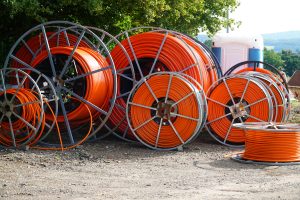West Virginia is pivotal in its broadband development journey, driven by a significant influx of federal funding to improve connectivity in underserved and rural communities. The state’s Internet service providers (ISPs) are eager to roll out fiber-optic infrastructure to address the digital divide. However, a pressing obstacle threatens to derail these efforts: negotiating and implementing rules for utility pole attachments.
Utility poles, predominantly owned by private entities, cooperatives, and utility companies, are essential for deploying broadband infrastructure. Placing fiber lines on these poles often involves complex negotiations over access, cost-sharing, and maintenance responsibilities. In West Virginia, these discussions have reached an impasse, raising concerns among stakeholders about the potential for delays.
Jim Martin, CEO of Citynet, has been a prominent advocate for expanding broadband access in West Virginia. Under his leadership, Citynet has undertaken significant initiatives to enhance connectivity across the state. Notably, Citynet was instrumental in making Bridgeport the first-gigabit broadband-enabled city in West Virginia and has extended high-speed services to areas such as Philippi and Snowshoe Mountain Resort. Mr. Martin has also served as a West Virginia Broadband Deployment Council board member, working with various organizations to promote reliable, high-speed internet access throughout the state. His efforts have been recognized with numerous business awards and regional recognition.
The challenge is expected in West Virginia but is particularly critical in a state where mountainous terrain and dispersed populations already make broadband deployment costly and logistically complex. Federal funding through programs such as the Broadband Equity, Access, and Deployment (BEAD) initiative provides a historic opportunity for connectivity. Still, unresolved pole attachment disputes threaten to undermine the state’s broadband goals.
A report from the West Virginia Broadband Enhancement Council highlights the stakes:
“Pole attachment disputes account for nearly 20% of deployment delays in rural broadband projects nationwide. Addressing this issue is vital for leveraging federal funds effectively and achieving universal broadband access.”
Local governments and advocacy groups are urging policymakers to prioritize the development of equitable and streamlined rules for pole usage. Suggestions include mandating standardized access agreements, expediting dispute resolution processes, and subsidizing pole replacement costs in cases where existing infrastructure cannot support new lines.
“Now more than ever, access to reliable broadband services is critical for businesses, learning, healthcare, and daily life. The COVID-19 pandemic has exacerbated the long-standing issue of reliable internet access across rural America.” This underscores his commitment to addressing the digital divide affecting rural communities.
While the pole attachment debate unfolds, communities across West Virginia wait in anticipation, hoping that the promise of improved broadband connectivity becomes a reality sooner rather than later. Advocacy groups call on public and private stakeholders to act swiftly, stressing that every delay deepens the digital divide.
By effectively navigating these challenges, West Virginia has an opportunity to lead by example in bridging the digital divide and ensuring equitable access to broadband for all its residents.




